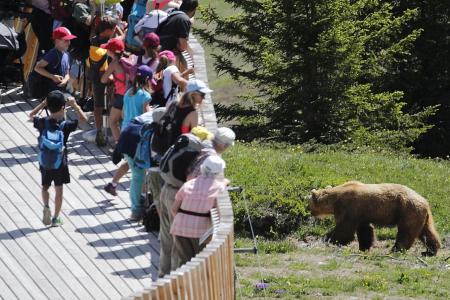Swiss resorts worry about melting snow
To battle effects of climate change, they create bear refuge and artificial snow
SWITZERLAND : The prospect of searing heatwaves driving holidaymakers to cool mountains and children asking grandparents about their memories of snow is focusing minds in Alpine ski resorts on the implications of climate change.
With global warming widely expected to slash snowfall, the Swiss tourism industry is looking for ways to preserve a lucrative business brutally exposed to the weather.
Enter Napa, Serbia's last circus bear. The Arosa ski resort in eastern Switzerland has created a US$6.5 million (S$9 million) refuge hosting Napa and two other bears rescued from cages at restaurants in Albania to help draw summer visitors and reduce its reliance on skiers and snowboarders.
Classes, families and a group of army veterans celebrating an 80th birthday were visiting one recent summer day, helping the park towards what Arosa tourism director Pascal Jenny said was a target of 50,000 visitors this year.
Arosa has reinvented itself before - moving to winter tourism in the 1930s after decades as a health resort for tuberculosis patients. But with nearly 620,000 overnight stays in winter last year, more than three times the summer total - it will not be easy.
Mr Jenny is hedging his bets.
"What gives us some hope is that artificial snow is making strong technical advances," he said on an observation platform beside the Weisshorn cable car, which gives a sweeping view of the snow-capped Alpine valley.
Mountain resorts tend to be higher in Switzerland than in Austria or France, giving them better chances as snow becomes scarcer.
But even at 3,000m, ski paths could see snow depths more than halved by 2100 if greenhouse gas emissions are not curbed, said a report in The Cryosphere, a geosciences journal.
Resorts below 1,200m - as about a quarter of Alpine ones are - might get almost no snow, said the 2017 report, "How much can we save?". Snow levels will gradually stabilise if global temperature rises are contained, it says.
Arosa is 1,775m up but Mr Jenny worries that a loss of snow in the lowlands will cost it visitors because people will lose their emotional connection with snow.
"That is almost more dangerous for the sector," he said.
Hence, his interest in an industrial estate in Denmark, where Arosa is cooperating on a project to make artificial snow so urban dwellers can learn to ski and then, he hopes, go on to hone their skills in the Alps.
The economics are clear: A daily lift pass for skiers in Arosa costs 79 Swiss francs (S$110), while a summer hiker or mountain biker typically pays 18 francs for a pass that lets them use a rope park, a swimming area and paddle boats on the town's lake.
Hotels and restaurants charge more in winter too, but the strong Swiss franc has priced many people out.
Switzerland is one of the wealthiest countries in the world, and the Swiss government said the long-term outlook for tourism is healthy.
"Mountain summers can position themselves as an alternative to the Mediterranean regions," a 2017 report said.
Summer tourism already accounts for 60 per cent of overnight stays across Switzerland, but the season brings in only 18 per cent of revenue, said Dr Therese Lehmann, an economist at the University of Bern's Centre for Regional Economic Development.
Government data already shows a 24 per cent drop in skiers in the decade to 2016, with other factors as well as climate change.
Europe's population is ageing and younger people are less interested in skiing.
Snowshoeing, winter hiking, sledding and ski touring - in which people hike up mountains - are on the increase, said industry lobby Swiss Tourism.
Consolidation of winter tourism is on the horizon, with overnight stays in bigger Swiss resorts up one per cent in the decade to 2015, but down 17 per cent in smaller ones. - REUTERS
Get The New Paper on your phone with the free TNP app. Download from the Apple App Store or Google Play Store now




